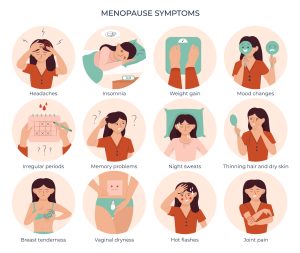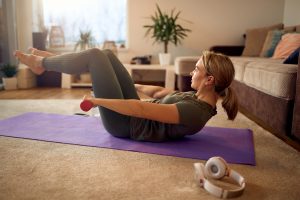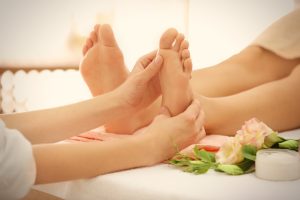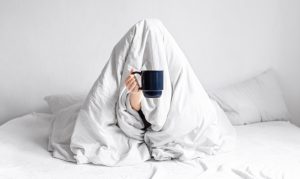
I became aware that I was perimenopausal when going through fertility treatment, and I started experiencing symptoms in my early 40’s.
In perimenopause, hormones such as oestrogen, progesterone and testosterone begin to fluctuate, and over time these hormones will dramatically fall due declining egg reserves. These changes in hormones are responsible for menopausal symptoms. The transition through to Menopause can take between 4 -12 years, and it is estimated that 80% of women in the UK experience some symptoms. The most common symptoms are hot flushes and night sweats; but low mood and anxiety, brain fog, weigh grain, itchy skin, loss of libido, vaginal dryness, and difficulty in sleeping are also common symptoms. I experienced pretty much all of these to some degree, although the anxiety, mood swings and insomnia were the most severe.
So, perimenopause and menopause can be a pretty tough time for many women. However, there are things that you can do that may help. The obvious approach is HRT, and I would recommend speaking to your GP if you are experiencing any symptoms which you feel are related to the menopause. There are also lifestyle changes that you can make to take care of your health as you head into perimenopause and beyond.
I decided to undertake specialist menopause training to help myself (selfish I know) and my clients through their menopause journey. The training taught me specific techniques and reflex points that I could use to help manage the symptoms of menopause. The course also highlighted five lifestyle changes that can go alongside HRT and reflexology to improve your overall health and wellbeing and improve your menopause journey.
1. Nutrition:

A Mediterranean style diet with plenty of olive oil, a variety of vegetables and pulses, and less reliance on refined carbohydrates is often recommended. This type of diet is generally low in processed foods, meat, dairy, sugar and salt, and high in fresh seasonal vegetables, beans, wholegrains, nuts and seeds.
If you are having hot flushes and/or night sweats then try reducing your sugar, alcohol and caffeine intake. Try stopping for 3 weeks and see if it makes a difference - although you may wish to eliminate one at a time.
I tried just making small changes to start with and it really helped. Instead of toast and jam (real comfort food in my eyes), I make Chai Jam to put on top of my toast so I get the same sweetness and comfort, but with less sugar and more protein (details of how to make it are at the end of the page).
I try and have plenty of salad or green vegetables with everything I eat (my husband is a dedicated meat eater so sometimes I find it easier to just add more vegetables to whatever he is cooking, rather than missing out completely), and I chuck some pine nuts and seeds on things as and where I can. Previously I used to view foods such as avocados as ‘bad’ and only to be eaten on rare occasions (ridiculous as I’ve always eaten loads of chocolate!). Nowadays I try and make sure that I have at least half an avocado a day as this is the type of fat that fills me up and has lots of health benefits, but it is different for each person. I’m still struggling to give up sugar. I don’t drink a lot of caffeine or alcohol but sugar, especially cake and chocolate, is my thing. It’s still work in progress, and I try not to be too hard on myself when I binge eat a family sized bar of chocolate, but I know my body suffers as my joints start to hurt again and my sciatica gets worse.
I’m not a nutritionist, but I would definitely recommend talking to one who specialises in the menopause if you are able to.
2. Exercise:

The British Menopause Society recommends regular weight bearing exercise e.g. walking, jogging, skipping, tennis. They suggest varying your exercise to keep fit and flexible.
Ideally, you should aim to do at least 150 minutes a week of moderate aerobic activity, plus strength exercises 2 or more days a week. But don’t just dive into this, build on what you already do and work-up to this level of exercise. Try not to make it too daunting: the weather is getting better (in theory!) so you could try and go for a nice walk in the evening after dinner.
I was a bit unsure of what I should do, so I started working out with a wonderful personal trainer (KRPT in Shoreham by Sea) who introduced me to the joy of boxing. It’s not something I’ve ever tried before, and I love it! It really helps get all my frustrations out, as well as being really good exercise!
3. Managing stress levels and making time for yourself
 Oestrogen and progesterone help shield us from cortisol (a stress hormone) so the fluctuations in these hormones can leave us feeling more anxious and lower in mood. Menopause also coincides with our already stressful lives: stressful jobs, young children (in my case) or children leaving home, and aging/ill parents. It is therefore imperative that we take some time to look after our emotional wellbeing and protect ourselves from the heightened impacts of cortisol.
Oestrogen and progesterone help shield us from cortisol (a stress hormone) so the fluctuations in these hormones can leave us feeling more anxious and lower in mood. Menopause also coincides with our already stressful lives: stressful jobs, young children (in my case) or children leaving home, and aging/ill parents. It is therefore imperative that we take some time to look after our emotional wellbeing and protect ourselves from the heightened impacts of cortisol.
If possible, look at the daily stressors in your life and look at ways to make positive changes to manage the situation. However, if this isn’t possible (and it often isn’t) there are still things you can do. Ideally, have regular reflexology and spend at least 10 minutes a day on relaxation techniques such as journaling, mindfulness or writing a list of three things you are grateful for. If you have more time, then you could try meditation, yoga, journal, walking, doing something creative, or talking to a good friend/family member.
Like a lot of women, I find it hard to put myself first for any decent length of time. There is always so much to do in our busy lives and I feel constant guilt if I’m not doing something ‘productive.’ But resting is productive, and If I can get 10 minutes of silence a day while I watch the birds then I’m much happier and calmer, which then makes me a much better mother, wife and reflexologist.
If anxiety and/or depression are affecting your daily life, then please talk to your GP.
4. Good Quality Sleep
 Too little sleep can have a detrimental effect on mental health, cardiac health, and cognitive function.
Too little sleep can have a detrimental effect on mental health, cardiac health, and cognitive function.
Hot flushes or night sweats, anxious thoughts, less deep sleep and frequent urination can all occur with reduced oestrogen levels. Progesterone has sleep-inducing effects on brain pathways, but this hormone also reduces during the menopause transition alongside melatonin (which controls our sleep-wake cycles) and can further disrupt sleep.
Reflexology has been shown to be a useful intervention to relieve fatigue and promote sleep, and should go alongside a good bedtime routine.
A good sleep routine includes:
Going to bed and getting up the same time everyday, even at the weekends. This helps set your circadian rhythm. When I get up, I found it helpful to get outside and into the daylight as soon as possible. I use the excuse of having to put the bird food out to get outside early with a cup of tea. I walk round the grass in the garden with my shoes off, and I instantly feel better about being awake and starting the day (I’m often forced awake by a small child scream/jumping on me, so this quiet time in the garden helps me back into a better frame of mind).
Have a specific wind-down programme before bed: Again, this should be the same routine every night and should not include looking at electronic devices. I find reading for at least half an hour before bed really helps me drift off quickly. But you could try listening to soft music or a podcast, meditating, or just having a nice warm bath before bed helps.
Create the right sleep environment: Personally, I like to have the room really cold (night sweats are so much fun!) and I like complete silence and as dark as possible. My husband on the other hand likes to fall asleep to noise and never shuts the curtains. We sleep in separate rooms in case you haven’t guessed 😉
It worth trying out a few different things and seeing what works for you.
Do not force sleep: If your unable to sleep then just try and rest and sleep might naturally take over. If after 30 – 45 minutes you still cannot sleep, then get up and move to somewhere comfortable and try reading a book or listening to quiet music. Only go back to bed when you feel sleepier.
Diet and exercise: A good diet and regular physical exercise can help us to relax and get better sleep. But avoid eating large meals close to bedtime and avoid stimulants such as caffeine and sweets things for 1 to 2 hours before bed.
Regular exercise helps with sleep but avoid anything too energetic 90 minutes before bedtime. You can try a gentler exercise like yoga to help you prepare for bed instead.
The NHS has some great videos about getting a better night’s sleep, and they can be found here:
https://www.nhs.uk/every-mind-matters/mental-wellbeing-tips/how-to-fall-asleep-faster-and-sleep-better/
5. Find enjoyment and purpose in life

The menopause can be a good opportunity to pause and take stock of your life. Are you on the right track or could you be doing something that brings more joy to your life – whether it be work, a hobby or volunteering? For me, it was a good motivator for moving away from a very stressful and (mentally) time consuming job, to becoming a reflexologist, which is something I love.
I re-trained to become a reflexologist in 2018, but it was only after the birth of my daughter when I turned 40 that I started thinking seriously about changing my job. I realised that the job I was in was too stressful and time consuming and didn’t bring me any personal fulfilment. I was able to return to work part-time after my maternity leave finished in 2020, and I set aside one afternoon and an evening a week for reflexology appointments. The business gradually grew from there to where I am now working as a full-time reflexologist.
There are some key questions to ask yourself if you’re thinking of making any major life changes:
- Firstly, what change do you want to make and what is your driving force for making this change?
- What are the benefits of making the change, and what are the possible negative impacts?
- Do you have the motivation, resources and knowledge required or will you need additional support (this could be in the form of support from friends and family, educational support, financial support or grants/loans, and childcare support).
- Are there any barriers that might prevent this change, and how can they be circumnavigated?
- Is the investment you are going to make going to be worth it? Big changes often take time, money and emotions – will this lead to improved wellbeing and healthy menopause?
- Is this change going to be sustainable for you longer term? This is why it is often better to start with small changes and then add others.
Being a reflexologist brings me as much joy as it does my clients, and I feel like I have a worthwhile purpose to my life again outside of my family. It’s probably been the biggest change that I have made during my menopause journey, and it has bought the most benefits. It started off just as a hobby, but it has grown into being my source of income as well as a source of happiness.
I hope the above information helps you. Every woman’s menopause journey is unique to them, but I wanted to share my journey and the tips that have helped me. I’ve tried to implement all of the above to varying degrees of success (still a chocoholic), while having regular reflexology and having the Mirena coil fitted. I’m pleased to say that symptoms are much improved. I’m still more anxious than I used to be, but I don’t have hot flushes anymore and the intense mood swings have definitely eased off, so that’s a benefit to everyone!
If you’d like to chat to me about how reflexology can help you with your menopause journey, then please call me on 07792 891525 to book an appointment. Prior to your first reflexology treatment with me, we would discuss your symptoms and current lifestyle which will allow me to tailor your reflexology treatment specifically for you.
Much love
Charlie xx
Shoreham Reflexology
Chia Seed Jam:
Put 1 x bag of frozen raspberries, 2 x tablespoons of tap water and 2 x handfuls of chia seeds in a saucepan over a moderate heat and continue to stir until the raspberries have defrosted, lost their shape and become a think, gloopy, jam-like substance. Put some on a nice piece of highly seeded toast and eat alongside a lovely cup of tea, ideally while sitting outside in the sunshine watching the birds (unless you’re in the UK in which case you’ll probably be indoors and trying to keep warm under a blanket). Put the rest into ice cube trays and freeze for use later.
References:
1. Kozakowski J, Gietka-Czernel M, Leszczyńska D, Majos A. Obesity in menopause - our
negligence or an unfortunate inevitability?. Prz Menopauzalny. 2017;16(2):61-65.
doi:10.5114/pm.2017.68594
2. Making friends with the menopause. Sarah Rayner. Dr P Fitzgerald
3. Mishra N, Mishra VN, Devanshi. Exercise beyond menopause: Dos and Don'ts. J Midlife
Health. 2011;2(2):51-56. doi:10.4103/0976-7800.92524
4. http://www.mentalhealth.org.uk/publications/fundamental-facts/
5. www.womens-health-concern.org/help-and-advice/factsheets/menopause-and-insomnia/
6. Effects of foot reflexology on fatigue, sleep and pain: a systematic review and meta-analysis.
Lee J, Han M, Chung Y, Kim J, Choi J.J Korean Acad Nurs. 2011 Dec;41(6):821-33
7. The effects of reflexology on sleep disorder in menopausal women. Maryam Asltoghiri, Zahra
Ghodsi. Procedia - Social and Behavioral Sciences, Volume 31, 2012, Pages 242-246,
8. The effects of reflexology applied to women aged between 40 and 60 on vasomotor
complaints and quality of life. Gozuyesil E, Baser M. Complement Ther Clin Pract. 2016
Aug;24:78-85.
9. The effects of reflexology on depression during menopause: A randomized controlled clinical
trial. F Mahdavipour et al. Complementary Therapies in Medicine, Volume 47, 2019,
